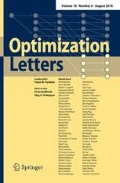Abstract
We describe an optimization model for interdicting smuggling of illicit nuclear material. Modeled on a directed network, the interdictor’s goal is to select radiation detector installation locations, subject to a budget constraint, to minimize a smuggler’s evasion probability. A smuggler, characterized by a random origin–destination pair, traverses the network knowing the detector locations. An additional layer of uncertainty is captured when considering a set of budget scenarios in place of a fixed budget value. An optimal solution to this model yields a priority list of detector installation locations. After the budget is revealed, detectors are installed from highest to lowest priority until the budget is exhausted. This notion captures time-phased securing of a transportation network as resources become available. Modeled as bilevel stochastic mixed-integer programs, both the fixed and random budget models are computationally challenging. Hence, we develop a tabu search heuristic to approximately solve both problem types, and we present computational results to assess the performance of our algorithm.

Similar content being viewed by others
References
Ahuja, R.K., Magnanti, T.L., Orlin, J.B.: Network Flows: Theory, Algorithms, and Applications. Prentice Hall, Upper Saddle River (1993)
Aringhieri, R.: Solving chanced-constrained programs combining tabu search and simulation. WEA 2004, LNCS 3059 3059, 30–41 (2004)
Barnes, J.W., Laguna, M., Glover, F.: An overview of tabu search approaches to production scheduling problems. In: Intelligent Scheduling Systems. Kluwer Press, Boston (1995)
Battiti, R., Tecchiolli, G.: The reactive tabu search. ORSA J. Comput. 6(2), 126–139 (1994)
Birge, J.R., Louveaux, F.: Introduction to Stochastic Programming. Springer-Verlag, New York (1997)
Costa, D., Silver, E.A.: Tabu search when noise is present: an illustration in the context of cause and effect analysis. J. Heuristics 4, 5–23 (1998)
Dean, B.C., Goemans, M.X., Vondrák, J.: Approximating the stochastic knapsack problem: the benefit of adaptivity. In: Proceedings of the 45th Annual IEEE Symposium on Foundations of Computer Science (FOCS’04), pp. 208–217 (2004)
Dial, R.B.: Algorithm 360: shortest-path forest with topological ordering. Commun. ACM 12, 632–633 (1969)
Dimitrov, N.B., Michalopoulos, D.P., Morton, D.P., Nehme, M.V., Pan, F., Popova, E., Schneider, E.A., Thoreson, G.G.: Network deployment of radiation detectors with physics-based detection probability calculations. Ann. Oper. Res. 187, 1–22 (2009)
Glover, F.: Tabu search—part I. ORSA J. Comput. 1(3), 190–206 (1989)
Glover, F.: Tabu search—part II. ORSA J. Comput. 2(1), 4–32 (1990)
Glover, F., Laguna, M.: Tabu Search. Kluwer Academic Publishers, Norwell (1997)
International Atomic Energy Agency: IAEA incident and trafficking database: 2013 fact sheet. http://www-ns.iaea.org/security/itdb.asp. Accessed 17 April 2014 (2014)
Koç, A., Morton, D.P.: Prioritization via stochastic optimization. Manag. Sci. doi:10.1287/mnsc.2013.1865 (2014) (to appear)
Løkketangen, A., Woodruff, D.L.: Progressive hedging and tabu search applied to mixed integer (0,1) multistage stochastic programming. J. Heuristics 2, 111–128 (1996)
Michalopoulos, D.P.: Prioritization and Optimization in Stochastic Network Interdiction Problems. PhD thesis, The University of Texas, Austin (2008)
Michalopoulos, D.P., Morton, D.P., Barnes, J.W.: Prioritizing network interdiction of nuclear smuggling. In: Stochastic Programming: Applications in Finance, Energy and Logistics, Operations Research/Computer Science Interfaces Series. World Scientific, London (2013)
Morton, D.P., Nehme, M.V.: Tightening a network interdiction model. In: IIE Annual Conference Proceedings (2009)
Morton, D.P., Pan, F., Saeger, K.J.: Models for nuclear smuggling interdiction. IIE Trans. 39(1), 3–14 (2007)
Pallottino, S., Scutellà, M.G.: A new algorithm for reoptimizing shortest paths when the arc costs change. Oper. Res. Lett. 31, 149–160 (2003)
Pan, F.: Stochastic Network Interdiction: Models and Methods. PhD thesis, The University of Texas, Austin (2005)
Pan, F., Morton, D.P.: Minimizing a stochastic maximum-reliability path. Networks 52(3), 111–119 (2008)
Sullivan, K.M., Morton, D.P., Pan, F., Smith, J.C.: Securing a border under asymmetric information. Naval Res. Logist. 61, 91–100 (2014)
Acknowledgments
The authors thank two anonymous referees for valuable suggestions, which improved the paper. This work was supported, in part, by DTRA through grant HDTRA1-08-1-0029 and the US DHS through grant number 2008-DN-077-ARI021-05.
Author information
Authors and Affiliations
Corresponding author
Rights and permissions
About this article
Cite this article
Michalopoulos, D.P., Barnes, J.W. & Morton, D.P. Prioritized interdiction of nuclear smuggling via tabu search. Optim Lett 9, 1477–1494 (2015). https://doi.org/10.1007/s11590-014-0829-4
Received:
Accepted:
Published:
Issue Date:
DOI: https://doi.org/10.1007/s11590-014-0829-4




